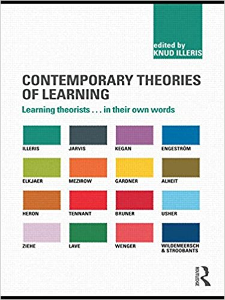Contemporary Theories of Learning

This book is a collection of writings that have established or influenced learning theories.
My reading notes
Ch. 1: A comprehensive understanding of human learning (Illeris, K.)
Ch. 2: Learning to be a person in society: learning to be me (Jarvis, P.)
Ch. 3: What “form” transforms? A constructive-developmental approach to transformative learning (Kegan, R.)
Ch. 4: Expansive learning: toward an activity-theoretical reconceptualization (Engestrom, Y.)
Ch. 5: Pragmatism: a learning theory for the future (Elkjaer, B.)
Ch. 6: An overview on transformative learning (Mezirow, J.)
Ch. 7: Multiple approaches to understanding (Gardner, H.)
Ch. 8: Biographical learning — within the new lifelong learning discourse (Alheit, P.)
Ch. 9: Life cycles and learning cycles (Heron, J.)
Ch. 10: Lifelong learning as a technology of the self (Tennant, M.)
Ch. 11: Culture, mind, and education (Bruner, J.)
Ch. 12: Experience, pedagogy, and social practices (Usher, R.)
Ch. 13: ‘Normal learning problems’ in youth: in the context of underlying cultural convictions (Ziehe, T.)
Ch. 14: The practice of learning (Lave, J.)
Ch. 15: A social theory of learning (Wenger, E.)
Ch. 16: Transitional learning and reflexive facilitation: the case of learning for work (Wildemeersch, D. and Stroobants, V.)